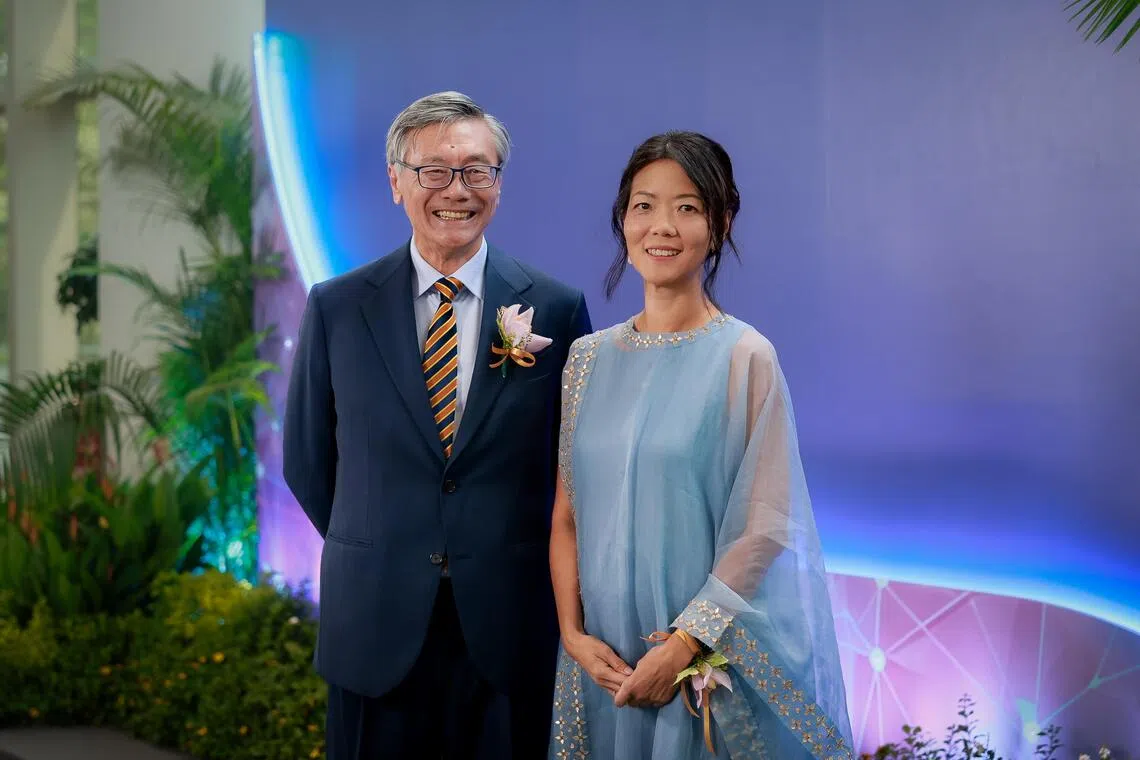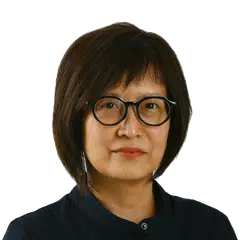Eight leaders and innovators receive President’s Science and Technology Awards for 2025
Sign up now: Get ST's newsletters delivered to your inbox

President’s Science and Technology Medal recipient Tan Eng Chye (left), and President’s Science Award recipient Lisa Ng at the President’s Science and Technology Awards Ceremony.
ST PHOTO: GAVIN FOO
- Eight leaders received President's Science and Technology Awards (PSTA) for contributions to Singapore's science and technology ecosystem.
- Professor Tan Eng Chye received the President's Science and Technology Medal, and Professors Lisa Ng and Lim Chwee Teck won the President's Science Award. Professor Ng Geok Ing took home the President’s Technology Award.
- Young Scientist Awards (YSA) were given to four researchers for advancements in regenerative medicine, viral encephalitis, AI & mixed reality, and AI models.
AI generated
SINGAPORE – Eight leaders and innovators have received the President’s Science and Technology Awards for their exceptional contributions to Singapore’s science and technology ecosystem.
The awards, administered by the National Research Foundation (NRF), were given out at a ceremony on Oct 3 at the University Cultural Centre in the National University of Singapore.
President Tharman Shanmugaratnam presented the President’s Science and Technology Medal – which is the top honour – to NUS president Tan Eng Chye for his visionary leadership and lifelong dedication to driving science and technology research at NUS and in Singapore.
NRF said in a statement that Professor Tan has dedicated his entire career to driving science and technology research. He shaped a deeply collaborative culture within NUS, and played a critical role in placing Singapore’s science and technology capabilities and achievements firmly on the world map.
Ahead of the ceremony, Prof Tan told the media: “What to me was particularly memorable was (the setting up of) the Centre for Quantum Technologies in 2007. It was the first research centre for blue-sky research in quantum computing.”
The centre is now one of the top research centres for quantum computing in the world, he said.
“I often say that the university is a talent organisation, so we basically have the best minds, and we groom them to contribute towards the nation and the world.”
The two recipients of the President’s Science Award in 2025 are Professor Lisa Ng, executive director of the A*Star Infectious Diseases Labs, and NUS Professor Lim Chwee Teck, director of the Institute for Health Innovation and Technology.
Prof Ng’s research on mosquito-borne viruses, especially chikungunya, has revealed how infections trigger both helpful and harmful immune responses, and how these may explain why patients recover differently.
These novel insights are underpinning improvements in the development of diagnostics, vaccines and treatments, and strengthening outbreak readiness in Singapore and the region, said NRF.
Prof Ng, who is also the executive director of A*Star’s Biomedical Research Council, said that when she first started out, her focus was solely on conducting research and publishing the findings.
During the Covid-19 pandemic, she saw how science made an immediate impact on people’s lives.
“So that changed my mindset, that it is not just about publishing papers. You can be doing very sexy science, but (if) the application is very limited... people are not going to benefit from what you do,” she said. “So, whatever I do, I want to be able to make a difference, to help the real world.”
In the field of cancer, Prof Lim has transformed the understanding of how cancers spread and how circulating cancer cells survive the intense physical and mechanical stresses they are exposed to as they travel through the blood circulatory system.
“Our body is remarkably effective at protecting itself, destroying about 99.99 per cent of cancer cells that enter the bloodstream. My research focuses on the rare 0.01 per cent that manage to survive, and I call these ‘mechano-resilient’ cells because they can withstand extreme physical stress,” he said.
“These cells have a unique ability to repair their DNA, strengthen the structure of their nuclei, which is like the ‘control centre’ of the cell, and resist the effects of chemotherapy.”
By studying how these cells survive and spread, researchers hope to identify their weak points.
“The goal is to develop therapies that block their self-repair systems and make them more fragile so that metastasis, the spread of cancer, can be stopped before it takes hold,” said Prof Lim. “This could mean patients receive more targeted treatments earlier, improving outcomes and quality of life.”

President’s Science Award recipients Lisa Ng (right) and Lim Chwee Teck at the President’s Science and Technology Awards Ceremony.
ST PHOTO: GAVIN FOO
Professor Ng Geok Ing from Nanyang Technological University took home the President’s Technology Award for helping to grow Singapore’s capabilities in gallium nitride (GaN), an advanced semiconductor technology that enables smaller, faster and more energy-efficient electronic devices.
Globally, GaN is gaining traction as a semiconductor material for applications in communications. Prof Ng’s efforts in this area, including setting up key facilities and training engineering teams, has culminated in the creation of a national platform that positions Singapore among global leaders in GaN technology
Prof Ng is concurrently executive director of the National Semiconductor Translation and Innovation Centre for Gallium Nitride, Singapore’s first national facility dedicated to GaN semiconductors.
During the ceremony, NRF chairman Heng Swee Keat gave out the Young Scientist Awards to four recipients.
They include Dr Andy Tay Kah Ping from NUS, who is advancing regenerative medicine with smart biomaterials that guide the immune system to speed up diabetic wound healing, and Dr Chan Yi Hao from the A*Star Infectious Diseases Labs. Dr Chan’s research, which has revealed how the brain defends itself against severe viral infections, could lead to new approaches for better diagnosis and care of viral encephalitis.
Another recipient is Dr Liu Ziwei from NTU, whose work on generative artificial intelligence (AI) and mixed reality enables realistic digital twins to be created and applied in areas ranging from healthcare to education.
Dr Wang Xinchao from NUS, whose work focuses on developing AI models that are more compact, faster and less dependent on large datasets, also received the Young Scientist Award.
In his speech, Mr Heng said that under the current five-year research, innovation and enterprise plan, or RIE2025, Singapore has invested about $28 billion, or about 1 per cent of gross domestic product, over five years until financial year 2025.
Singapore is home to more than 4,500 tech start-ups, and venture capital investment in early-stage deep tech deals has more than tripled from $500 million in 2020 to $1.6 billion in 2023. Mr Heng said these have been built on the foundations of cutting-edge basic research and talent in Singapore’s universities, A*Star and other institutions.
In a statement on Oct 3, Professor Tan Chorh Chuan, Permanent Secretary for National Research and Development, said: “Talent and cutting-edge (science and technology) are critical for translating research into outcomes that significantly contribute to Singapore’s competitiveness and continued growth.”
The awards not only celebrate the achievements of research leaders who are breaking new ground in science and technology and their application, but also underscore the value that Singapore places on research and innovation, he added.



